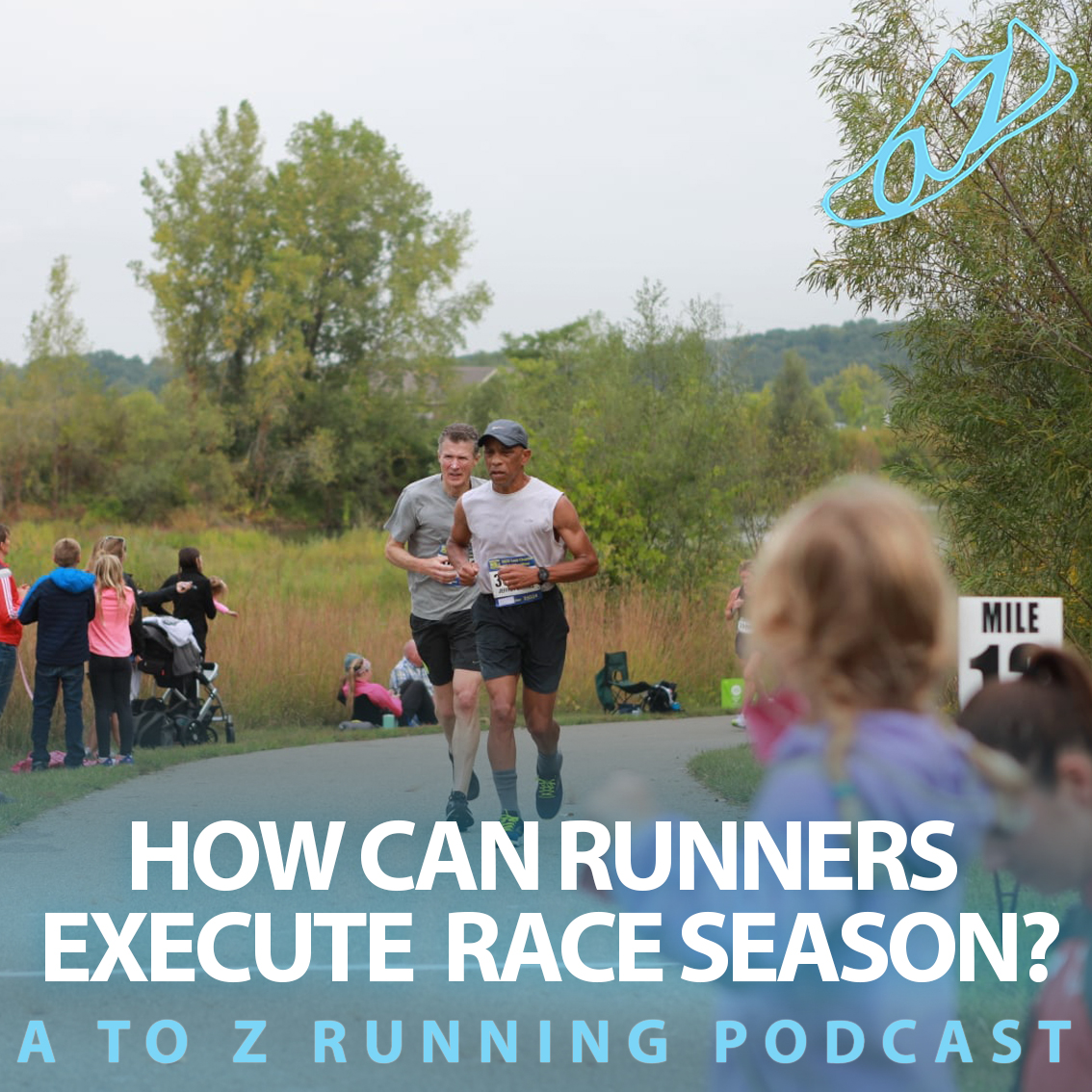LISTEN
In this episode of the A to Z Running Podcast, Andi and Zach unpack the topic of running a racing season. We practically discuss the answer to the question, “How can runners execute race season?”
INTRO
- Follow and Subscribe (on YouTube or your favorite podcast platform)
- Our topic today is about executing race season.
- Three things:
- Racing should be a season, not a one-off
- Training is different when building fitness vs. optimizing performance
- Opportunity to get outside yourself, so seize it!
- Three things:
- Listener question from Anne @margsandmarathons and @samfromamsterdam about strides.
- Question from Anne: What is the advantage of running strides IN a run opposed to at the end?
- Question from @samfromamsterdam: Why take 5 minutes in between strides?
- Easier to do it right when sprinkled throughout a run when we use the alactic energy system, acquiring no lactic buildup, and have no increased recovery needs.
- We learned a lot of what we know on this topic from Keith Livingstone – Healthy Intelligent Training
World of Running
Friday, April 9th- in St. Louis, Andi meets Running Niche
- Tune in for an exclusive with Bob Dryer and Jen about why they love and invest in the running community.
Sunday, April 11th – in Ethiopia at the national championships
- Gudaf Tsegay won the 5k in 14:49 at almost 8k ft altitude
- She beat WR holder Letesenbet Giday by 7 seconds in a final lap kick
- Recall that she broke the WR indoor 1500m run earlier this winter… one to watch for Olympics and other international contests!
Saturday, April 10th – Miramar Invitational (Miramar, Florida)
- Notable because it is the first of the USATF series they are calling “Journey to Gold”…
- Not incredibly fast…
- Ajee’ Wilson took the 800m
- Some fast running in the sprints…
- Everyone is talking about whether guys like Matthew Centrowitz and Robby Andrews are still big dogs
- Both at the 2015/17 world champs
- Both at the 2016 Olympics
- NEITHER one running fast
- (Andrews got Lyme disease a couple years ago and hasn’t been the same since)
Saturday, April 10th – Bolles Last Chance Meet in Florida
- Rheinhardt Harrison ran 8:47 3200m for a new Florida state record
- (not on the all-time USA list, but still fast!)
Friday, April 9th – Letsrun reported NN Mission Marathon
- Race organizers announced fields for NN marathon on April 8th
- *this is Kipchoge’s team, includes
- Kenenisa Bekele (previous 5k/10k WR)
- Joshua Cheptegai (5k/10k WR)
- Geoffrey Kamworor (previous HM WR)
- Among others…
- The most notable factor is that Kipchoge’s last race was the bummer London run
- This is the kind of race that is intended to give chances for people to improve world ranking status (men rankings; women rankings) prior to team selection for Olympic games
- Ex: Kipchoge isn’t even ranked in the first several hundred…
Saturday, April 3rd – Dorney, England (Athletics Weekly)
- Yuko Gordon ran 3:29 marathon… at 70 years of age (how old? She ran in the inaugural women’s Olympic marathon in 1984)
- New British W70 record, possibly new world W70 record (unclear because there are faster performances that have not been and may never be ratified)
MAIN TOPIC: HOW CAN RUNNERS EXECUTE RACE SEASON?
As Oliver Hoare so excellently articulated during last week’s conversation, racing season is an opportunity to learn before our main event. This week on the A to Z Running podcast we unpack the practical application of a race season and give some tips on how to do it well. During this episode we answer the question, “How can runners execute a race season?”
Three things:
- Racing should be a season, not a one-off
- Training is different when building fitness vs. optimizing performance
- Opportunity to get outside yourself, so seize it!
Racing as a season
When we are able to view racing as a season and get a couple on the schedule, we can then utilize them to identify weaknesses. Oliver Hoare said in our previous podcast, “A bad race is better than a good training session.”
A few great questions to ask yourself,
- What did I do well in this race?
- Did I execute my race plan?
- Where is there room for growth?
- What will help me to improve in future races?
When we race as a season we also have the opportunity to practice key factors. Some factors are dealing with race anxiety and uncertainty, nutrition needs, drills, pre-race strides, activation, shoes, clothes, and more.
We also get the chance to experience many different race scenarios to prepare for all kinds of weather, terrain, and any number of challenges. All the experiences you have make you better prepared to visualize yourself in any scenario and overcome a variety of obstacles.
Train to Optimize Performance
When we are able to get feedback from race experiences we can allow the results to help inform us how to train to optimize for performance.
RELATED ARTICLE: Pulling off a Successful Race Season, 5 Things
The key considerations:
- Training focused on coordinating fitness
- Training to fill gaps (identified by those races!)
- Training to add final elements (depends on focus race)
- For marathon: economy stuff is likely an ingredient not much addressed
- For shorter distances, true speed and anaerobic efficiency is necessary
We mentioned recently that we need to “train where we are, not where we want to be.”
- The same is true for races.
- We need to race WHERE WE ARE not where we want to be.
We chip away at our goals step by step and if a distance runner knows anything, it’s that we can’t always see the finish line, but we are closer with every step. When we are approaching a race that is not at our peak, we need to have proper goals for the race beyond the time goal.
Get outside yourself
Racing is challenging and vulnerable. We get outside ourselves when executing race season by jumping into races. Here are the benefits:
- Training is generally monotonous; racing is generally exciting.
- A way to make some of the more taxing efforts more interesting and rewarding
- A way to stay connected to running community (sense of community, shared experience)
- The easiest way to hold yourself accountable (frequent and transparent)
- Become vulnerable to your goal by placing yourself in situations where you care about the outcome.
Racing is a learned skill. We can improve our tactics, mentality, and training approach from information we gain from racing. If you’ve loved this episode “How can runners execute race season?” please subscribe for more free content!




Leave a Reply
Want to join the discussion?Feel free to contribute!